Tags
American, Americas, apothecaries, armadillos, Atlantic, Bonham Norton, Book Arts Program, bookseller, botanists, Bristol, British, calf, cancer, cassava, cigars, cocoa, common cold, cure, De Jonge Amerikaan, disease, docks, English, entrepreneur, Europe, ginger, gold, handmade, herbs, Indians, Inquisition, iron, John Frampton, Jonathan Sandberg, London, medicine, merchants, minerals, monks, Native American, nephrite jade, Netherlands, New World, Nicolás Bautista Monardes, nicotain, papermaking, papers, paradise, physician, plant, poison, print culture, quinine, rhubarb, sasparilla, sassafras, Seville, silver, smoking, soldiers, Spanish colonies, syphilis, tobacco, tobaco, trade, vernacular, woodblock, woodcuts
“This is the substance which I haue gathered of this hearb, so celebrated and called Tobaco for that surely it is an hearb of great affirmation for the excellent vertues that it hath…”
Ioyfvll newes out of the new-found vvorlde
Nicolás Bautista Monardes (ca. 1500-1588)
London: E. Allde, by the assigne of Bonham Norton, 1596
Third English edition
Translated by John Frampton (fl. 1577-1596) from several treatises first published in 1565 by Nicolás Monardes, the son of a bookseller, and a distinguished physician of Seville. Monardes, who never traveled to the Americas, wrote several treatises on healing, medicine, and trade with the Spanish colonies on the Atlantic. He learned most of what he wrote about from spending time at the Seville docks, where he gathered information from sailors, soldiers, merchants, monks, royal officials, and even women.
Monardes described the cultivation and use of quinine, sassafras, cassava, rhubarb, ginger, and sasparilla. He wrote about cocoa, armadillos, minerals and metals (iron, silver, nephrite jade), and diseases like syphilis.
He wrote a lengthy description of an American plant introduced to Europe, calling it “tobaco” or “nicotain,” which he claimed was an antidote to poison. He wrote of more than twenty conditions, including the common cold and cancer, that could be cured with the use of tobacco.
“The Indians of our Occidental Indias, doo use the Tobaco for to take away the wearinesse, and for to make lightsomnesse in their Labour, which in their Daunces they bee so muche wearied, and they remaine so wearie, that they can scarcely stirre: & because that they may labour the next day, and returne to do that foolish exercise, they receiue at the mouth and nose, the smoke of the Tobaco, and they remaine as dead people: and being so, they be eased in such sorte, that when they be awakened of their sleepe, they remaine without weariness, and may return to their labour as much as before, and so they doe alwaies, when they have need of it: for with that sleepe, they do receiue their strength and be much the lustier.”
John Frampton, a Bristol merchant, had been imprisoned by the Inquisition. He translated several Spanish texts about the New World while in confinement. The British looked upon the New World as long-lost paradise with its vegetative bounty and ancient wisdom regarding human ailments, beneficial not just for its precious metals but for its plants. Being published in the vernacular, first in Spanish, then in English, meant that common readers, along with botanists and apothecaries, bought the publications. Frampton, ever the entrepreneur, re-titled the work “joyful news,” counting on brisk sales of the book and the trade in plants from the Americas. The “trade” print culture disseminated new data targeted toward popular practicality but also imagination, circulating news of an “other” ready reality just waiting ’round the bend. Such was the miracle of discovery, such was the miracle of plants, such was the miracle of print.
Illustrated with twelve woodcuts depicting herbs and plants. Rare Books copy bound in 19th century calf, ruled in gold.
De Jonge Amerikaan
Netherlands, ca. 1800
NE1154 J66 1800z
Woodblock depicting a Native American in a feather headdress and loincloth smoking a long clay pipe in a coastal setting with two ships behind him. Around this scene are a crown, trident, winged-staff, cigars, snuff jar, tobacco leaves and baled tobacco. It is likely that this woodblock was printed on paper used for tobacco wrappers, a practice that began as early as 1660 in Holland, one of the world’s great shipping centers.
Below are three prints made by Jonathan Sandberg using the woodblock, demonstrating different papers, including a paper handmade by students in last spring’s papermaking class offered by the Book Arts Program.
On July 1, 2018 The University of Utah went tobacco free and said farewell to its last cigarette.

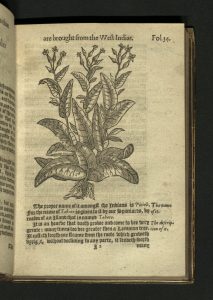
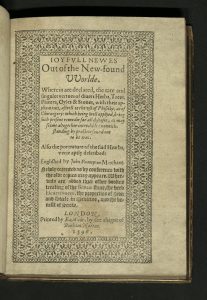
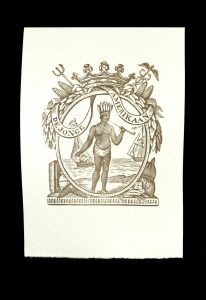
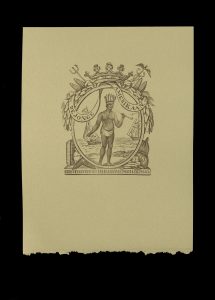
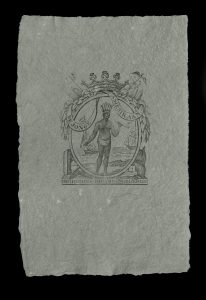
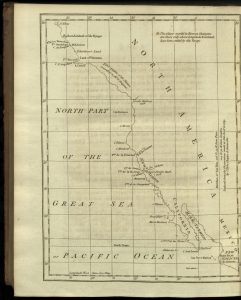
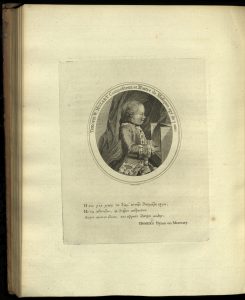
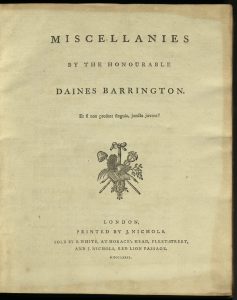
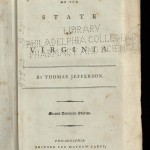
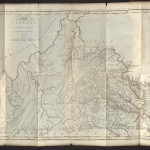
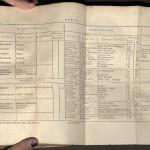
You must be logged in to post a comment.